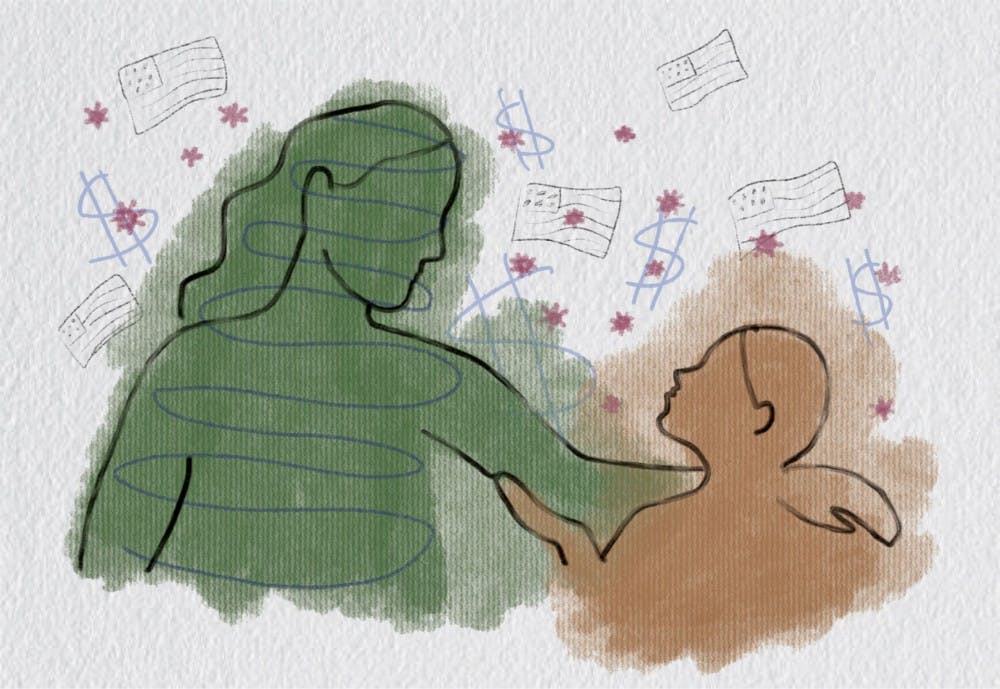
After stay-at-home orders were implemented in March, Mercedes, an undocumented immigrant, saw her work hours drop from 40 hours to 30 hours a week. The hotel she worked at as a receptionist at had fewer customers stay, she said.
Her $300 electric bill and $900 rent depleted the $2,000 in her savings account, she said. Mercedes’ sister even helped her pay rent and drove from Boston to Gainesville in March to watch Rodolfo, her 10-year-old son, after Alachua County Public Schools transitioned to online learning in March. Mercedes, 36, who asked to be identified by her first name only to protect her identity, worked during the day and could not watch him, she said.
Like Mercedes, some immigrants suffer from reduced work hours and difficult schedules during the COVID-19 pandemic. Those with children struggled even more with the transition to online learning. Despite hardships, undocumented immigrants didn’t qualify for aid from the Coronavirus Aid, Relief, and Economic Security Act. Mercedes, who is originally from Honduras, was one of many who didn’t qualify for federal aid because she’s undocumented.
“These resources need to be available for everyone,” she said. “They call Gainesville a melting pot, but it’s not really showing like that.”
The CARES Act gave economic relief to Alachua County residents struggling with loss of income up to $2,500. However, some immigrant families couldn’t receive federal help after losing their jobs because of their immigration status, said Liz Ibarrola, the director of immigration concerns for the Human Rights Coalition of Alachua County.
To receive CARES funding, applicants had to submit a social security number and form of identification. However, Ibarrola said, undocumented immigrants don’t have social security numbers or federal forms of identification.
The City of Gainesville granted undocumented residents a stimulus check in June. The Human Rights Coalition of Alachua County distributed a total of $30,000 to 13 families in need. Each family was eligible to receive up to $2,500 through two installments of $1,250 but had to live within city limits.
Families outside of Gainesville who commute into the city to work at local businesses were left without aid, Ibarrola said. The coalition also fundraised $20,000 dollars for 22 other families in a similar situation. Each family received about $1,000.
Maria, a 34-year-old Gainesville resident and undocumented immigrant, received about $1,200 from Madres Sin Fronteras, a social movement in Gainesville advocating for human rights, she said.
Maria lost her job at the Holiday Inn on Archer Road in May. Since then, Maria has stayed at home with her two sons while carrying her 7-month pregnancy.
Her husband has become the household’s primary breadwinner, but his work hours were also scaled down, Maria said.
The family used their savings accounts to pay for their $200 to $300 electric bill and $1,000 rent since June, Maria said. Since March, they have used about $9,000 to buy food and keep up with the boys, she added.
The cost of groceries doubled to $800 a month, Maria said. The family picked up free meals from her sons’ schools to save money. Because of the situation she finds herself in, she’d like assistance with food and help was scarce due to her undocumented status.
She said because her husband is working, and she is undocumented, she fears that other people may view her as a dead weight in society. She recently received her work permit and is authorized to work in the U.S., but isn’t legal in the U.S. yet. She asked to be identified by her first name to protect her identity.
“No one imagined the impact COVID-19 would have in our Latin community,” she said in Spanish. “It has completely changed people’s lives.”





